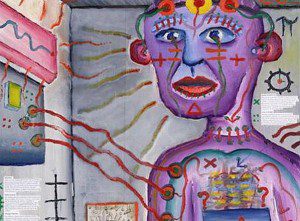By Cortland Pfeffer
Contributing writer for Wake Up World
People with bipolar disorder and schizophrenia are among the most discriminated against people in the history of the world.
A “psycho” is a derogatory term for someone who is psychotic. Someone who is psychotic is a person suffering from psychosis. Psychosis is characterized by a disconnection from reality. That is it, and all there is to it!
A “psycho” is someone who is experiencing a disconnection from reality!
At first the term was “mad,” then we called them “crazy,” then “insane,” which became “lunacy” or “lunatics,” and then of course “psychosis” or “psychotic.” Just as humans have always done, when we do not understand something, we label it as different and persecute those people. But, this is the one group of people that are still left in the darkness. We still do not understand it. Even though we label it as a “medical disease”, schizophrenics still end up locked behind bars, and it is the last group of people in society in which it is still socially acceptable to discriminate against.
In the very ancient times, the shamanistic cultures viewed schizophrenics as having a connection to the spirit world. They would train them as to how to use this power, this gift, to connect with their higher self and earn them the title of “healer.”
Eventually as civilizations started to form, governments were created, along with rules, laws, and norms were passed down to keep peace and order. This was meant to conform others to those in power. Schizophrenia then became viewed as different, bizarre, chaotic, and mad. People with this “disorder” were then persecuted, drowned, buried alive, burnt at the stake, locked in institutions, had parts of their brain cut out, and/or were kept highly medicated to control these abnormalities.
So what is schizophrenia?
Medically speaking, it is a diagnosis that is characterized by abnormalities in the perception or expression of reality and the sense of the self. These “abnormalities” are described as hallucinations and delusions.
Hallucinations consist of hearing things that do not appear to be there, and seeing things that do not appear to be present. Delusions are beliefs that appear “strange” and that only the person diagnosed believes to be real or true, and refuse to think otherwise – hence, refusal to conform.
On a side note, the next version of the Diagnostic and Statistical Manual of Mental Disorders (DSM) is planning to include “non-conformity” as a mental disorder. They have gone from trying to be secretive about these things, to just being quite upfront. If you do not act as we want you to do, then you are sick. And if you are sick, you need to take this drug. But this drug is expensive, so you need this insurance coverage.
However, these descriptions are clinical terms used to help give a diagnosis, which allows for treatment in a society and culture that has agreed upon the best way to treat of any so-called “mental illness” is with a drug. In the past it was hospitalization in which they never treated the person, but rather abused them and labeled them as insane.
What would happen if we were to actually look deeper into what these “symptoms” include in non-clinical terms — considering instead how the client them-self experiences them?
The hallucinations are nothing more than an over-sharpening of the senses and experiencing unusual sensations. It can feel like an out-of-body experience and having difficulty deciphering the difference from reality and illusion. Everything tends to flow together as one – the wall never ends – but instead flows together with the flooring. Auditory hallucinations or the “hearing of voices” which is so often mocked and ridiculed, is a part of being in-tune with higher frequencies.
It is scientifically proven that we do not see objects as they are, but rather a transformation and interpretation made by our eyes and mind. The brain filters out what it deems to be unnecessary information. This isn’t new age, make-belief information, this is physics. Some physicists have estimated that the percentage of light we see on the spectrum is between 1.5 percent and 2.3 percent! That means that there is up to 98-percent of things that we are incapable of seeing.
We communicate daily via invisible radio waves through internet, cell phones, television, and radio. Radio refers to sending energy with waves. Energy is transmitted across the globe without any direct connection. The end result is an announcer speaks into a microphone and the signal travels at the speed of light via radio waves, is received by another signal, and if we tune our radio dial to the right frequency we can hear their voice without any direct connection.
Are schizophrenics seeing and hearing what we cannot?
So keeping in mind what physicists have told us about our reality, is it possible that if someone has heightened senses, they could be seeing parts of the 98-percent of the world we do not see? Or, like many animals, hearing things at a different frequency that we are not tuned in to? I would say it is almost certain!
Psychosis – such as schizophrenia and mania – is all to do with cracking the ego. The experience is so intense that words can not describe. The ego, also known as the “false self”, is everything that we thought we knew to be true about ourselves. The reality we have come to know is breaking right before our eyes. The ego, or mask, is kept in place to protect us from danger – but it also is incredibly limiting.
During this experience, you break out of this mask you have been wearing your entire life. You feel an intense amount of energy that takes you to the depths of your soul. Your soul is set free for the first time since you were an infant, which is the reason for such rapid changes. As a part of this, all your senses are incredibly heightened and you start to question everything around you. You ask things such as “Is this real?” “Am I going crazy?” “Did I Die?”
If we are able to resist nothing and allow this experience to continue, we will feel other symptoms such as feeling connection and a sense of oneness with the universe. You begin to feel that you are everyone and everything, and they are all you. An intense level of understanding takes over and everything makes sense, you finally seem to just “get it.” All the answers to life are in the grasp of your finger tips. Along with the heightened senses of vision and hearing, you also are in tune with those around you almost to the point of feeling their senses, emotions, and thoughts. The sense of time disappears, all that exists is the present moment. All worries seem to disappear as an intense sense of love for everything appears and everything becomes incredibly sacred. Along with this connection, you may also begin to feel that everything is a test from your creator, and you no longer see people in their worldly form, but rather you see their souls and see the message they are bringing to you.
You are changed!
As this state of consciousness comes down, it changes everything. Your priorities and values change quite dramatically. It is as though you have been given the answers to all of life’s mysteries, and to return to the worldly form can be depressing.
I would like you to now go back and read the last three paragraphs and take them out of context. Just read what this experience of psychosis feels like to the person. Now, instead of saying psychosis refers to cracking of the ego, exchange the word “psychosis” for “enlightenment.” Enlightenment refers to ‘cracking of the ego’, right? Now if you re-read those same three paragraphs describing the sensory experience. What is being described is the exact same thing.
The difference is with enlightenment – people try many ways to achieve this experience through deep meditations, vision quests, soul dances, and psychedelic drugs, etc. Yet those who are labeled as mentally ill, who’ve been discriminated against more than any other group of people, tend to have this same experience happen to them naturally! In fact, if you were to experience bipolar mania and try and explain it to someone, the most common response is “I think you need help.”
And “help,” in our society means to medicate the person so they no longer have these mystical experiences. Now, I do acknowledge that sometimes these hallucinations and delusions can be quite harmful in the sense they are asking people to act violently and they are seeing demons. This is likely due to the either trauma or repressed feelings. It is still a good sign that the person is breaking away from their ego, but they need to be guided by someone with experience so they can get closer to the enlightenment side of the spectrum.
The story of the ‘lunatic’ on the grass: A schizophrenic golfer unwittingly removes stigma of mental health
As a mental health worker, every week we would have our team meetings in which we would go over the treatment plans of the 16 patients in our “Intense psych rehab.”
I had been off for a while, I had needed time out. I was now back and this was the first treatment meeting I had been to since my return. My mind was empty and blank. I didn’t know anything to be true for sure, I had given up on almost everything, which, as it turned out, was a good thing.
We would have the mental health practitioner present the patients, their goals and their progress.
We talked about this new patient, a schizophrenic, and we discuss his goals. It is said that this is a ‘career schizophrenic’ that goes to hospitals over and over. His goal is to marry Paris Hilton and play golf on the European golf tour.
Well everyone cracks up, the laughing is intense, everyone teases, ridicules, and assassinates his character.
20 mostly privileged white ‘kids’ in their 20s sitting in this board room with their first psych job, determining the fates of these patients.
I am a little intrigued with this new case because I love golf. I am terrible at golf, however to be outside in nature with the sun for 4 hours I love.
The lessons golf taught me was like exercise for my mind. Every shot matters in the same way that every moment matters. If I hit the ball near a tree, then become angry and impulsive, and try to smack it out of the woods, it will likely hit a tree, and I’ll be in worse shape. However, if I let my ego down, and chip it out, then I will be better off.
It all adds up, little things matter, have patience, and the only shot that matters is the one in front of you. Swing soft and the ball will go further, nothing is as it seems. Do the opposite of what the ego tells you to do. You can’t beat nature, go with nature. Use your talents, don’t try to be like other players. Stay within yourself, and be humble.
This is why I loved golf. It was some sort of meditation for me. Those things I learned in golf, could be said of life as well.
I walk upstairs and I see these ratty old shoes hanging over one of the couches. I look over and there’s guy, the ‘Paris Hilton golfer guy’ we’d talked about. He wears the same clothes every day, it is likely all he owns. He says he’s not sick but he has to take medications. He gets angry if anyone tries to talk to him, about his “illness.”
I just walk him daily for about 2 months, the whole time thinking he’s a typical schizophrenic, so let’s write our notes, get him out of here and go home. Lets get our checks and continue living the lie. I was so embarrassed to be there, a part of this industry, I just didn’t want to talk to him….and I felt like a fraud.
It was nice outside early that spring so I brought my clubs in one day as I was going to go play golf after work. They were brand new fancy clubs. I tried to act like I was ‘the man’, because truly I hated myself at the time and didn’t know why.
Now I know, because that was one of my false selves. A mask I was wearing, it wasn’t who I really am. When you run from your true self, you suffer.
So at times I talked to him about golf to measure his awareness. He knew a lot so I was surprised. Just person to person talks. He had started coming down to talk to me more because it was more of a friendship than me in my role there – just asking him about his “coping skills” and his “goals,” and the other bull they teach you to say in school, and at these expensive trainings.
He didn’t feel threatened by me or assume I was prodding him in order to write things down on his chart. When patients act nervous or suspicious, we are taught to think: “See, they are paranoid.”
However, is that really paranoid? We read their charts and decide who they are without ever getting to know them! I think their lack of trust and not wanting us to write things down is a perfectly normal response based on the circumstances they are usually in. If they say the wrong thing to the wrong person, then its another forced treatment and commitment.
I swung my clubs inside that day. He saw me, and said “Whoah, you got a good swing, not bad.” He saw my clubs and asked “hey can I take a swing?”
Now what I was doing here was something that would be considered inappropriate as I was displaying poor boundaries with a client. Most of the people running these places would say that I should be discussing his treatment and goals and his plan only. Teaching him the “coping skills” that the book says.
However, no one will talk to you about anything real if you don’t build a relationship with them first. We seem to miss that in mental health.
I think it’s funny that we ask these people to tell us everything about themselves in particular the worst moments in their lives. Yet we give them nothing. We force releases of information to be signed by court order, and we use the information against them. Then we call the patients non-complaint if they refuse.
I wasn’t purposely manipulating a relationship either, I was genuinely talking to him like an equal, without regards to the societal roles we were playing. So I told him, “yeah, take a swing, let’s see.”
This was the beginning of one of the most deeply profound experiences of my life – one in which my false selves would all die. But there was more to come this profound moment didn’t take place in a church, in a school, or as part of a momentous occasion. No, I was about to learn about life from a lifelong schizophrenic at a golf course!
Not quite as I had dreamt this moment of enlightenment would be!
He swung the club and it was one of the nicest swings I had seen in person. I was shocked. Of course that didn’t mean he was a European pro. However, I did start to doubt my own pre-conceived notions as an “expert.” Could I, the all mighty one be wrong in my beliefs? It brought me back to a time when I was working at the county hospital. One of the doctors training me said, “You don’t treat the diagnosis, you treat the patient, everyone is different.”
I had an idea, and I went to get support from the program director to take my new golfing friend (and anyone else who wanted to come) to the driving range. I chose the ‘the university’ where I got my golf lessons, it was close and I was familiar with this place.
I got the O.K, and we drove the van to the driving range. We arrive and there is a bunch of young kids — teens with fancy clubs and clothes, looking us over as we walk onto the course — a group of mentally ill patients.
They had that look like “Umm I think you guys are lost” or the “Not in our neighborhood” looks.
Here is a schizophrenic guy with 20 year old shoes, long hair, and 10 year old jeans. We had no clubs other than mine. All the course can offer my friend is a 9 iron for kids, which typically a professional golfer can use to hit a ball about 150 yards. I’m sure they had more appropriate clubs on offer, but it seemed they didn’t want the lunatic ruining their clubs. In fact, they didn’t want the lunatic on the grass!
He says “O.K.”, he wasn’t arguing. This man is 6’5. In addition to being an ‘ill-fit’ for a man of this height, this club looked as thought it had been well used by kids for about 20 years or more, but my lunatic friend is just happy to be there…as is everyone else.
Then came that moment, the one that changes everything!
He puts the ball down. All these young teens, with their 3000 dollar clubs and their fancy clothes are all chuckling and watching, I am watching, the other patients are watching. The tension is building.
He says “Wow, I haven’t swung a club in a long time.”
I was so nervous at this point – I could see all eyes were watching, and I was wondered, was this a delusion? By bringing him here, am I hurting this guy and embarrassing him? I felt my body get tighter, my teeth were clenched, my heart racing, I was really feeling it.
I look at his face, I watch his eyes, they aren’t schizophrenic eyes. His tongue was tightly wrapped on the outside left side of his mouth. He has this grimace on his face – the look of extreme like focus. I glanced at his feet, they are not schizophrenic feet anymore, they are solid, on the ground, in perfect stance. His arms are not schizophrenic arms, the hand grip is right, but the club does not fit him.
I sense the energy building as everyone was watching this “freak.” The thing is, he couldn’t sense it – he already knew what we were about to find out. He wasn’t hitting the ball for just himself, he was hitting it for me, to give me hope. He was hitting it for the other patients. He was hitting it for the watching teens — the bunch of 18 to 22 year-olds who already have their mind made up, and they wait because they want to laugh. He was hitting it for them!
And then it happened – he hit the ball, it goes well over 175 yards, with a childs 9 iron! The ball flew so high in the air, in a manner a pro-golfer would hit it. It towered over the earth, and the ball was so beautiful in flight, it was like a magical TV moment. I could not believe it, and as for the others, well you could have heard a pin drop! Complete and total silence – everyone was still. The world had stopped, and mine had changed forever.
It was all perfect!
Had the first shot been a miss, no one would have watched any longer. The first shot was the key! But it wasn’t a ball you could say was just struck well by an amateur. It all had the look of a really talented golfer. He hadn’t swung a club in years, he had a girls junior club, he carried no fancy equipment, nor did he wear fancy shoes or a glove. He was in jeans, a sweatshirt, and those old raggedy shoes.
He didn’t do it right just once though, he did it over and over again! Eventually people were not whispering anymore, and after a time they went back to hitting their balls.
Then more magic happened!
At a driving range like this, you see many golfers hitting many balls. They are all in flight and all hit well. But on this day there was always one ball that towered over the rest and made the others look like little kids. I started watching the teens – they had started swinging and missing, and hitting terrible shots. Our schizophrenic’s style may have been affecting their game, after all in their minds, schizophrenics who look like this guy are not supposed to do what he is doing.
I could barely move. I had been shown the truth yet again. I hit some O.K shots myself that day, but it didn’t really matter anymore. Things had changed for me.
My new golfing friend walked over and started giving me tips on my golf swing, and all those tips worked well. I couldn’t believe this. Then I look behind me and see there is 20 teens watching him hit the ball – watching him teach me! It was all surreal and utterly impressive. Of course watching from the side were our other patients, tripping and laughing, running around. The world had been moved – for all of us!
Then came another moment – a moment that still tears me up as I write this account here now. One teen with extreme courage and bravery came up and asked my friend for advice on his swing. What courage to do this in front of his shaken peers. Instead of teasing, he came and asked for help. Earlier they had mocked and judged, but my guy didn’t care about that. He said “sure”, as it was obvious he loved helping. Before we knew it we had the schizophrenic giving golf tips to these college golfers. I would never be the same, and I knew it in that moment.
I remember getting back to the facility and sitting down. My co-workers said “You must really like golf, I’ve never seen you so alive and energized.” I could not describe what I had just seen and my account here is still not doing it justice. All I could say was “yeah I like golf.”
We went to golf again maybe 3 times he and I, and we had long talks in the car. He started telling me about his life growing up, how he got involved in the system. I started teaching him about schizophrenia.
Eventually, he said to me, “Well I’ve been going to these hospitals and group homes for over 20 years, and no one has ever explained it to me like that. I think I do have that disease, actually maybe they are right.”
I think others had explained it to him, but he hadn’t listened, because no one had ever listened to him. He was open and without fear with me. Ironically, I only talked to him by chance really, and prior to that I had ignored him for 2 months.
Everyone played a role in my ‘inner change’ at that time – from the negative mental health practitioner who tried to make a joke of his treatment plan, to the great program director. I started to listen carefully to what my golfing friend said when he went on a rant, instead of just falling back on preconceived notions as I would have done in the past. He talk about the college he went to, so I decided to look it up online, and there it was, a picture of him, clean cut, well dressed and very well groomed. He had a 4.0 and was captain of a division-1 golf team. I decided wanted to be his caddy and get him into tournaments. Did he have the talent to be a pro-golfer? I don’t know, but he was good enough to make himself some money for sure. Unfortunately, it never happened.
But my life changed forever with that first swing that stopped the world, and it happened at a time when I had given up on the ‘mental health industry’ coming to believe it was all a fraud. My life change made me realize the mental health industry wasn’t always a terrible business. Yes there are terrible things that happen, and terrible abuses do occur, but that was not good enough reason reason to give it all up completely – I had been shown good reason to stay. I would work on the inside and do my best to create change. It is only a fraud if we allow it to be.
There is a moral to this story…
We have the power over every present moment we are in. Present moments will always build on the past moments, much like golf. We can always find evil if we look for it. However as Socrates said “Our energy is better spent on focusing on positive future than on the negative past.” And it was Francis of Assisi who said “The best criticism of the bad is the practice of the better“.
The point of this article is to acknowledge that everyone is human, we are all connected, and we all have things to offer. If we put our being into treating others as equals deserving of love and respect (without the ‘superiors and inferiors’ nonsense), then things start to change for the better. When you drop the facades and preconceptions, the ego allows you to see truth and that’s when magic happens. When we take that leap, (or are forced into it like those with schizophrenia), what happens is a type of freedom and beauty enters your life, that I can’t explain with mere words.
But I can say this: Labels can destroy lives!
My greatest teacher was a “schizophrenic” – a man who had been committed to an institution for over 10 years, by a court who deemed him “crazy”. Like others I worked along side of, I had almost closed myself off to him because I believed the label he’d been given – that of sick and delusional man – could NOT be a teacher, let alone my teacher. Yet there he was waiting for me – my greatest ever teacher – and all I had to do was ‘lose the mask’ and forget the labels to see him for who he really was. Is this not what seeking enlightenment is all about?
About the author:
Cortland Pfeffer founded his website Taking The Mask Off in 2014 with the intention of shining a light on the mental health industry and sharing real life stories that have been gathered over 20 years. Cortland (a pen-name) is a psychiatric Registered Nurse and has worked in the field over 18 years. Before that and during this time, he was also a patient in psychiatric hospitals, jails, and treatment centers himself.

If you've found value in our articles, we invite you to support the release of our brand-new book, "Gratitude Practices for Kids: A Practical Guide for Adults to Instill a Spirit of Appreciation and Positivity in the Next Generation."
"Gratitude Practices for Kids" brings together over 25 innovative and accessible practices designed to enhance gratitude in everyday life. This comprehensive guide is backed by 17 scientific studies, ensuring each concept is grounded in research, underscoring our commitment to nurturing growth, emotional intelligence, and positive interactions between adults and children.
We encourage you to opt for the paperback version to celebrate this new release. Dive into its fresh pages away from digital distractions, allowing you to immerse yourself in the transformative practices it offers.
Over recent years, Wake Up World has faced significant online censorship, which has impacted our financial ability to operate. Moving into book publishing represents a strategic step to secure the ongoing funds needed to continue our mission. By purchasing Gratitude for Kids, you help us keep our content free and accessible to everyone, avoiding needing a paywall. With over 8,500 articles published in the last 13 years, we remain dedicated to keeping our valuable content open to all.










